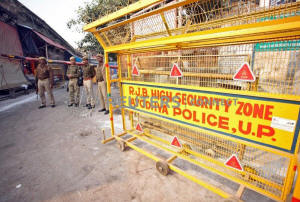Indian court gives disputed religious site to Hindus in landmark ruling
 Send a link to a friend
Send a link to a friend
 [November 09, 2019]
By Nigam Prusty, Suchitra Mohanty and Mayank Bhardwaj [November 09, 2019]
By Nigam Prusty, Suchitra Mohanty and Mayank Bhardwaj
NEW DELHI/AYODHYA, India (Reuters) -
India's Supreme Court on Saturday awarded a bitterly disputed religious
site to Hindus, dealing a defeat to Muslims who also claim the land that
has sparked some of the bloodiest riots in the history of independent
India.
The ruling in the dispute between Hindu and Muslim groups paves the way
for the construction of a Hindu temple on the site in the northern town
of Ayodhya, a proposal long supported by Prime Minister Narendra Modi's
ruling Hindu-nationalist party.
Representatives of the Muslim group involved in the case criticised the
judgment as unfair and said it was likely to seek a review of the
verdict.
In 1992 a Hindu mob destroyed the 16th-century Babri Mosque on the site,
triggering riots in which about 2,000 people, most of them Muslims, were
killed across the country.
Court battles over the ownership of the site followed.

Jubilant Hindus, who have long campaigned for a temple to be built on
the ruins of the mosque, set off fire crackers in celebration in Ayodhya
after the court decision was announced.
Thousands of paramilitary force members and police were deployed in
Ayodhya and other sensitive areas across India. There were no immediate
reports of unrest.
"This verdict shouldn't be seen as a win or loss for anybody," Modi said
on Twitter.
"May peace and harmony prevail!"
Still, the verdict is likely to be viewed as win for Modi's ruling
Bharatiya Janata Party (BJP) and its backers.
It comes months after Modi's government stripped the Muslim-majority
Jammu and Kashmir region of its special status as a state, delivering on
yet another election promise to its largely Hindu support base.
Neelanjan Sircar, an assistant professor at Ashoka University near New
Delhi, said the court ruling would benefit the BJP, which won
re-election in May, but a slowing economy would ultimately take centre
stage for voters.
"In the short term, there will be a boost for the BJP," said Sircar.
"These things don't work forever ... Ram Temple isn't going to put food
on the table."
Hindus believe the site is the birthplace of Lord Ram, a physical
incarnation of the Hindu god Vishnu, and say the site was holy for
Hindus long before the Muslim Mughals, India's most prominent Islamic
rulers, built the Babri mosque there in 1528.
'MILESTONE'
The five-judge bench, headed by the Chief Justice Ranjan Gogoi, reached
a unanimous judgment to hand over the plot of just 2.77 acres (1.1
hectares), or about the size of a soccer field, to the Hindu group.
[to top of second column]
|

Policemen stand guard next to a security barricade on a street,
before the Supreme Court's verdict on a disputed religious site
claimed by both majority Hindus and Muslim, in Ayodhya, India,
November 9, 2019. REUTERS/Stringer NO ARCHIVES. NO RESALES.

The court also directed that another plot of 5 acres (2 hectare) in
Ayodhya be provided to the Muslim group that contested the case but
that was not enough to mollify some.
"The country is now moving towards becoming a Hindu nation,"
Asaduddin Owaisi, an influential Muslim opposition politician, told
reporters.
Modi's party hailed the ruling as a "milestone".
"I welcome the court decision and appeal to all religious groups to
accept the decision," Home Minister Amit Shah, who is also president
of the BJP, said on Twitter.
The Sunni Muslim group involved in the case said it would likely
file a review petition, which could trigger another protracted legal
battle.
"This is not a justice," said the group's lawyer, Zafaryab Jilani.
Muslim organisations appealed for calm.
The Hindu group Rashtriya Swayamsevak Sangh - the parent
organisation of Modi's party - had already decided against any
celebrations to avoid provoking sectarian violence between India's
majority Hindus and Muslims, who constitute 14% of its 1.3 billion
people.
Restrictions were placed on gatherings in some places and internet
services were suspended. Elsewhere, police monitored social media to
curb rumours.
Streets in Ayodhya were largely deserted and security personnel
patrolled the main road to Lucknow, the capital of the northern
state of Uttar Pradesh.
Ayodhya residents were glued to their televisions and mobile phones
for news of the ruling, which delighted Hindus when it came.

"Everyone should come together to ensure that the construction work
begins at the site without any delay," roadside vendor Jitan Singh
said over the chants of "Jai Shri Ram" (hail Lord Ram) from fellow
shop-keepers.
(Additional reporting Sankalp Phartiyal, Devjyot Ghoshal and Manoj
Kumar in New Delhi; Saurabh Sharma in Ayodhya; Kanishka Singh in
Lucknow; Swati Bhat, Shilpa Jamkhandikar and Rajendra Jadhav in
Mumbai; Writing by Rupam Jain and Alexandra Ulmer; Editing by Euan
Rocha, Robert Birsel)
[© 2019 Thomson Reuters. All rights
reserved.]
Copyright 2019 Reuters. All rights reserved. This material may not be published,
broadcast, rewritten or redistributed.
Thompson Reuters is solely responsible for this content. |